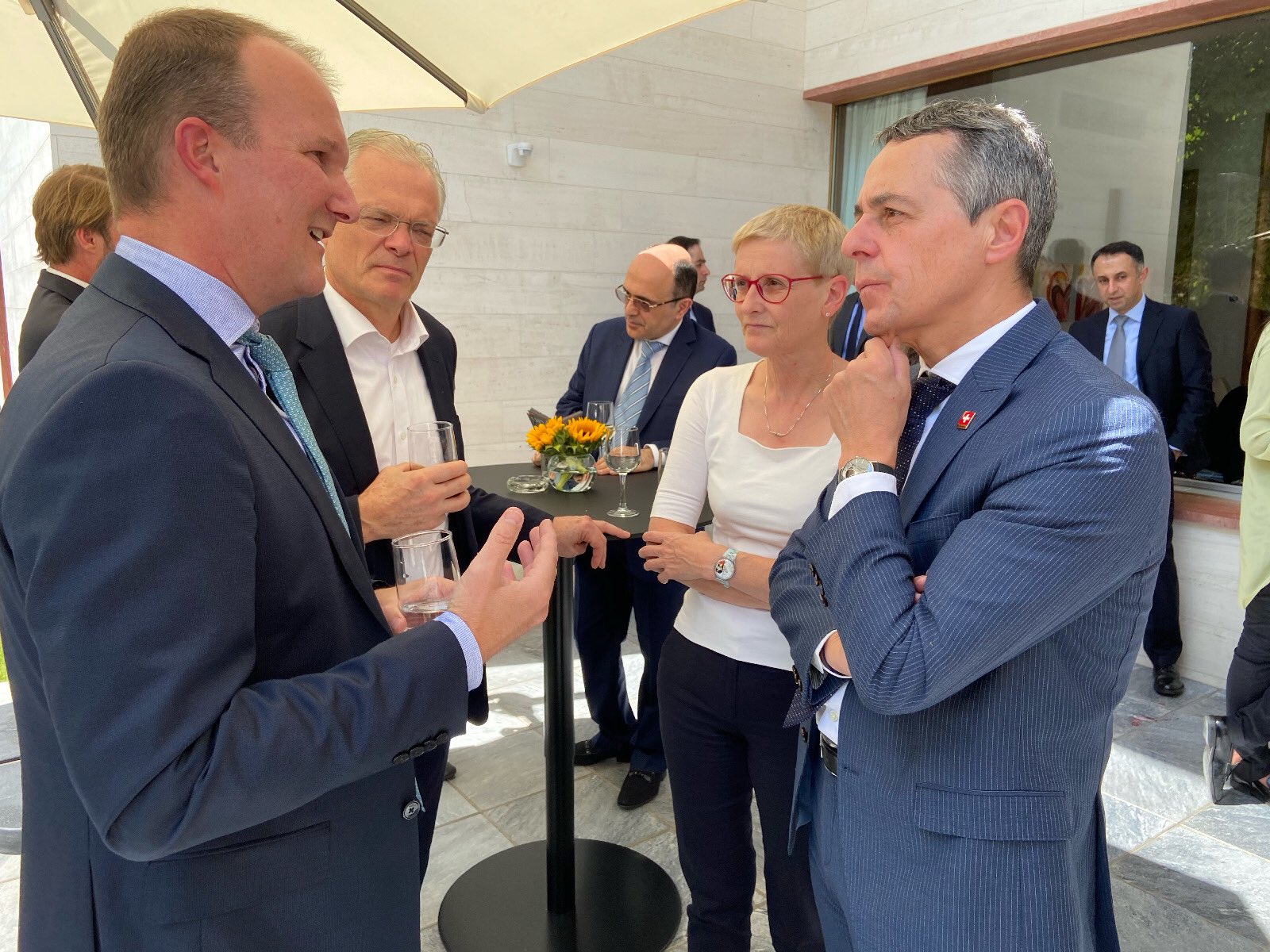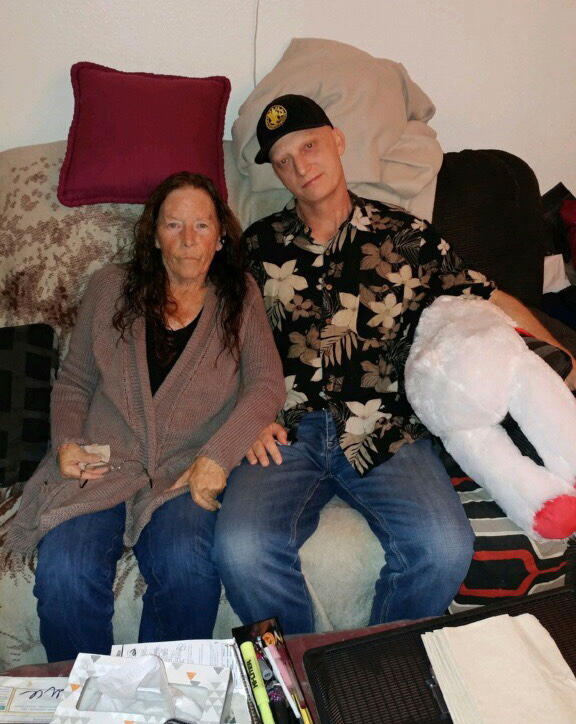‘What’s the point of International Geneva if our role is just the messenger?’

Senator Thomas Minder accompanied a high-level Swiss delegation on a recent official visit to Tehran aimed at strengthening ties with Iran. He is convinced Switzerland could expand its role as a mediator in the region.
swissinfo.ch: You are just back from an official visit to Iran with Swiss Foreign Minister Ignazio Cassis. What is your verdict?
Thomas Minder: The situation is tense, but Switzerland is in an ideal position to negotiate. It can do this. Perhaps not directly at the head-of-state level, but at the No. 2 or 3 level – with the economy minister, for example.
We often forget that the context is much broader than just the conflict between the United States and Iran. Iran also has no relations with Saudi Arabia. These two states are conducting a proxy war in Yemen. Here, too, we have protecting power mandates. Neutral Switzerland is trusted to mediate in this conflict.
Did you make any progress on these issues?
We are talking, people are showing willing, but it needs more courage, more proactive steps, to bring Iran and the US to the table.
So far, Switzerland hasn’t tried to serve as an active mediator between the US and Iran. It has only been a messenger.
But the role of the Swiss embassy in Iran could be expanded. We have high standing with the Iranian people and politicians. We represent the interests of the US in the country and we maintain good relations in the US. We should make more of these things. What’s the point of International Geneva if our role is just the messenger?

It’s a tricky business – this is not just about politics.
Of course we can talk with Iran for 100 years about human rights. Yes, it’s crazy what happens there. But we will not make progress like that, especially not in the Trump era, with more stringent sanctions and harsh penalties for violations.
What possibilities do you see?
Switzerland already has two channels open. We are allowed to export medical goods and, in the nutrition sector, baby food. Perhaps, in small steps, we will succeed in opening a third track. I am not talking about lifting sanctions or about free trade. But the economy is definitely the right path. Having a roadmap for Iran will not be enough for Switzerland in the long term.
So Switzerland does have a roadmap? What does it envisage?
There are twelve points on it and we are moving a millimetre at a time.
For example?
On the matter of relations between Iran and Saudi Arabia, Switzerland appears to have no strategy for progress. We almost ended up representing Saudi interests in one city and those of the US in another.
What is holding it back?
There needs to be more will. This applies to Foreign Minister Cassis. His party represents the business community. But he needs to put more emphasis on business in Iran. The humanitarian aspects will follow. Under Cassis’s predecessors, we were, in my view, either too passive or too fixated on human rights. Because it’s clear that people will only sit down at a table together if they can negotiate on economic issues.
Federal Councillor @ignaziocassisExternal link draws a positive assessment of his visit to Tehran
— Swiss MFA (@SwissMFA) September 7, 2020External link
The discussions with President @HassanRouhaniExternal link & Minister of Foreign Affairs @JZarifExternal link focused on protecting power mandates & efforts to ensure the region's stability
https://t.co/HbFXlwwhRlExternal link pic.twitter.com/wCAjIXhs0HExternal link
How are Swiss businesses in Iran doing?
They are treading water. One representative of a publicly-traded Swiss corporation said to me: “We’re here, but we’re not doing anything.”
Is everything at a standstill? Does that mean the US sanctions are having an impact?
No. The country is functioning, the shelves are full, the markets are too. No one should kid themselves that the sanctions are working. There is a parallel economy. We drove in a new Mercedes past a Samsung shop and a Lego shop. The Iranian leadership, right up to Iran’s supreme leader, Ayatollah Ali Khamenei, uses Apple devices.
We saw Nestlé Kit Kat bars and Nespresso. Coffee isn’t a humanitarian product, but it finds a way into the country. This is a problem. It can’t be in Nestlé’s interest that Nestlé products are offered on the grey market. And yet no serious Swiss company would dare to do business in Iran as long as it is illegal. The US imposes severe penalties.
After three days in luxury hotels and limousines, do you believe you have the complete picture as far as Iran’s economy goes?
I talked to people. Of course they are suffering under extreme inflation. Importing goods via the parallel economy makes there more expensive. The black market erodes the tax base.
But I am nonetheless convinced that we can only start talking about more human rights and rule of law if we get rid of these damned sanctions.
At the same time, there are many critics of doing trade and talking with Iran. They say: first human rights, then we’ll discuss the rest.
That means waiting 100 more years. There is already a strong opposition in the country; protests, demonstrations in front of the parliament, bomb attacks. We can’t ignore this unrest in the population. And we Swiss do not keep silent. We talked about a lot of things: the death penalty for minors, for example. We are making some progress there, but it is a long process.
What was your impression of the Swiss diplomatic staff and our foreign minister?
Good, multilingual, some of them even speak Farsi. That’s excellent. But that’s the thing – they are diplomats. I am a businessman. And I see it like this – if you have spent four days in a country like that and enjoy that kind of esteem and have so many top-level meetings, then at the end you sit down at a table together with a Swiss pen and sign a letter of intent, at the very least.
What gives you the impression that Switzerland is so well-regarded?
You feel and hear it everywhere. One example: We met some Iranian lawmakers. They have just founded a parliamentary Iran-Switzerland group. In Iran, that attracts votes.
The Iranian parliament is not necessarily democratically legitimate.
Not at all. The candidates are pre-selected by the Guardian Council. This should also be discussed, but as I said, I don’t see this as the focus. We don’t have to talk about democracy first. You can start up a dialogue with a more low-key issue, such as water policy or forestry.
Are there projects in these areas?
I have proposed them to researchers, lawmakers and the foreign ministry. Iran has big problems with increasing drought. Its forests are dying, and we have so much expertise in bark beetles and forestry. What’s more, we have already conducted tests with our Ticino chestnut trees in Ethiopia. This tree sustains drought very well. Iran’s foreign minister agreed with me and wants to open discussions.
Foreign Minister Ignazio Cassis visited Iran from September 5-7, 2020 with a Swiss delegation. The occasion for the official visit was to celebrate 100 years of Swiss diplomatic presence in Iran.
At the centre of discussions were bilateral relations and Switzerland’s protecting power mandates. Since 1980, Switzerland has represented US interests in Iran. In 2017, Switzerland took on protecting power mandates for Iran in Saudi Arabia and for Saudi Arabia in Iran. It has also represented Iran in Canada since 2019. Source: Swiss foreign ministryExternal link.

In compliance with the JTI standards
More: SWI swissinfo.ch certified by the Journalism Trust Initiative













Join the conversation!